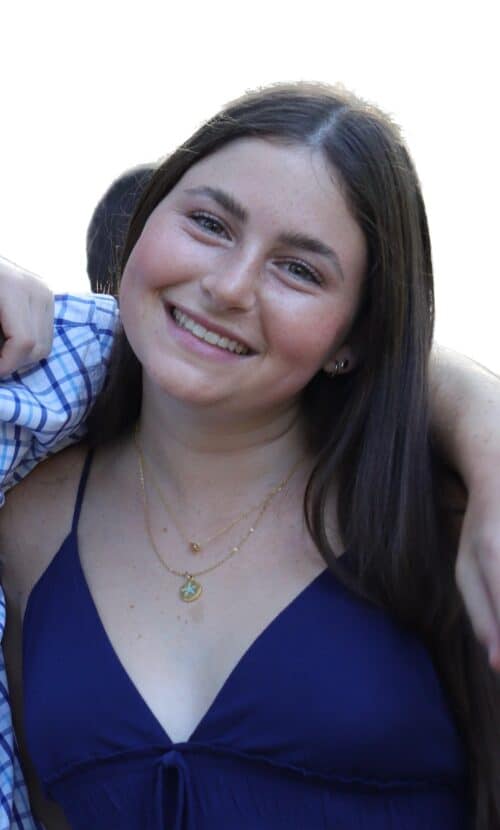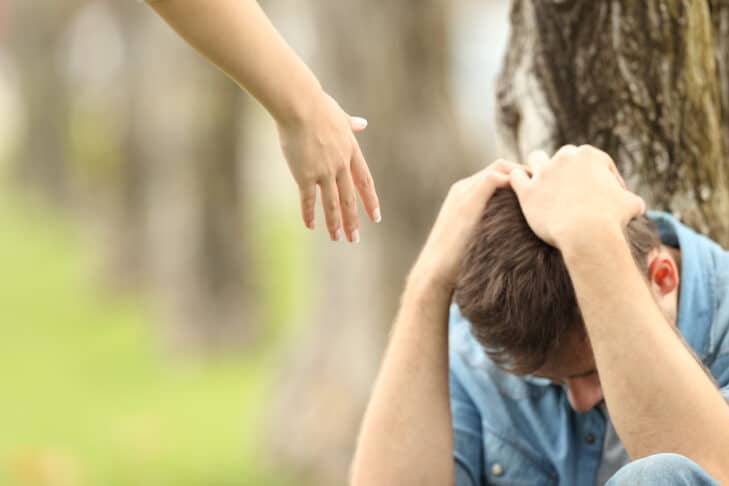Absorbing the horrific news from the Middle East is hard enough for adults—let alone kids. How are they feeling? What do they need? I talked to two teen leaders, Jewish Teen Initiative fellows Molly Fishman (a junior at Natick High School) and Noa Helmbrecht (a senior at Lexington High School) for their perspective.
How are your Jewish peers feeling right now?
Noa Helmbrecht: Right now, I know that I and others are feeling concerned, confused and upset about the current situation in Israel. Over this week, these feelings have definitely intensified. Especially if people have family and friends in Israel: I know that can be very scary.
This being said, I think people are trying their best to stay hopeful and do what they can to support people who are in need in Israel and at the same time worrying about the well-being of innocent Palestinians. I know many people who have donated to reputable organizations and who have spoken up about the situation, all in hopes of making a difference.
Molly Fishman: I think my Jewish friends are living in fear and have been extremely upset and overwhelmed. We all woke up [last] Saturday to devastating news, and it has caused us to fall into a rabbit hole of information; sometimes it’s hard to [determine] what sources are even accurate.
I spent a term living in Israel and attending the Alexander Muss High School in Israel. I created friendships with students from across the United States, and we have been able to express our emotions over the phone, which makes me feel safe and secure within that community; it’s a good outlet to manage our stress and relate to people with whom I have similarities.
We all feel scared to express our opinions and speak out because we are unsure of the reactions we will receive. However, we have encouraged each other to speak out with the reminder: We are all in this together. Over the past week, I think there has been a constant feeling of stress and anxiety as new information keeps coming out, with good news hard to find.
How do you feel?

Helmbrecht: I feel like both innocent Israelis and innocent Palestinians should not have to deal with these circumstances. I think there is a lot of confusion between who Israel is fighting with, and I feel that they are targeting a terrorist organization who is hiding behind the Palestinian people. I feel that there are so many unnecessary deaths occurring and that there is a lot of hate going on at the moment.
Fishman: I have a really strong connection with Israel as I’ve spent this past April until August living there and exploring the country. I have more family there than in the United States, as well as friends and past counselors. My personal connection to the country is really strong but adds more stress to the situation because of how “close to home” possible attacks could impact my family. Over most of this week the war has been pretty much the only thing I can focus on; it makes me so upset, angry and emotional thinking about everything that has happened and continues to happen. I’ve had moments where I’ve thought about random Israelis that I’ve interacted with: possible tour guides, store owners, even bus drivers, and the thought that they could be one of those killed or held hostage haunts me, because I’ll never know.
Sometimes, I feel guilty and helpless. Guilt because I feel like I owe so much to Israel: My best memories, friends and experiences have come from my time in Israel, and I feel as if I need to do something to repay the country and its people. As much as I’ve tried to help, I feel helpless because I can’t actively help from so far away other than donating money.
I feel angry that something like this has happened, how people are being treated and how some paint Israel in a negative light. I’m angry that not everyone can recognize what is going on and that some can justify terrorism, which is never the answer. It also angers me that almost every single person I have seen post about the conflict is Jewish. My non-Jewish friends are silent, which angers me, because during Black Lives Matter movements, school shootings, the war against Ukraine, et cetera, these same people were quick to post about it. People have the time to post about the newest music or a sports score but can’t take the time to read a quick article and educate themselves. This angers me the most.
One of my non-Jewish friends showed me an Instagram story that raised awareness for Israel and said, “Is the girl who posted this even Jewish?” That moment has stuck with me recently and added to my anger. You don’t have to be Jewish to be anti-terrorism, to support your Jewish friends. I feel numb from all of the information I am seeing through horrible pictures, stories and data.
Where are you getting news and information?
Helmbrecht: I am getting the majority of my information by joining calls led by Jewish organizations designed to allow teens to ask questions and receive reliable information.
Fishman: I’ve been watching the news each night on NBC, reading daily news stories from The New York Times or sources local to Israel, like The Jerusalem Post. The IDF also posts updates on their Instagram as well as Stand With Us. Those are credible. However, random re-posts of data are hard to confirm the accuracy of, so I usually have to do my own research.
How are you coping, and do you have any advice for teens who are trying to make sense of this?
Helmbrecht: I am coping by talking to my Jewish communities and my Jewish friends. For those who are struggling, I would advise staying away from social media, especially people who are posting harmful content. I would also tell them to reach out to people, even if you don’t normally. Having others to talk to who are going through a similar experience as you can help to organize your thoughts and feel better.

Fishman: It helps me to check in on my friends and family living in Israel. To hear about what they are doing day to day and how they are staying safe is really reassuring. I’m also coping by staying connected with my Jewish friends. Many of them are very willing to discuss this topic as they feel the same ways as I do. Ranting and explaining our emotions to people who understand and feel similarly helps me to express what I’m feeling and get some of my anger out of me.
My advice for teens who are trying to make sense of this would be to first educate yourself well enough on the topic to be able to have a complete understanding of the situation. There are so many outlets of news, but it’s important to stick to the facts and get a baseline understanding; this helps to make sense of the situation when there is an endless supply of news. Once you’re educated, talk to people in your Jewish community; you can relate to them, learn from them and cope with them.
How can non-Jewish peers and friends support you right now?
Helmbrecht: Non-Jewish peers and friends can acknowledge that this is a situation that is affecting their Jewish peers’ lives. Not saying anything can make it feel like they don’t care, so just saying that you hope they are OK, and letting them know you are here for them, can make a big difference.
Fishman: I think it’s really important for our non-Jewish peers to learn about the situation going on in Israel and get a complete understanding of the horror everyone in Israel has been facing. It’s so important that they understand what is going on so that us Jews do not feel alone. We need their help and their support, as we are only a small percent of the population. I hope my non-Jewish peers can take a few minutes out of their day to learn about the conflict so that they too can educate others and help Jews feel more supported.
What can adults, educators, parents and leaders do to support you?
Helmbrecht: I think if an educator feels as though they have reliable information about the topic, and feels comfortable having a conversation in class, that could be great. If not, again, just acknowledging that it is something that students are dealing with can go a long way. Overall, just checking in with your Jewish friends and peers can make an impact, even if the conversation is minimal.
Fishman: I think adults/educators/parents/et cetera need to understand that it is really hard to give my full attention to school and normal life when a country I care so much about, with people I care so much about, is at war and fighting for their lives and right to exist. It’s very hard for me to balance everything right now with the added stress from the conflict and mental energy I have spent. I think teachers need to at least acknowledge what is going on because it makes both Palestinian and Jewish students feel overlooked and ignored. I think it is very important for teachers to educate their students on this topic so anti-Israel and antisemitic views don’t emerge for students. Adults also need to understand the weight that the conflict has on our shoulders.
How are you managing social media? Is it a part of your life? Have you had to phase it out or turn it down a bit due to the news, or are you using it more?
Helmbrecht: I have been on social media but have tried to cut back on watching the news and looking at posts about the war. I find that much of the content being posted is incorrect and can even be hurtful or disturbing. I have posted to show my support for Israel but have not gotten into politics or posted anything that could be hurtful to someone else.
Fishman: Social media is a big part of my life and how I connect with my friends who live all over. Over the first weekend of the conflict, I couldn’t put my phone down. I found myself refreshing every feed to find information and see who was speaking out. The endless flow of information and posts is very draining and is not good for you. Yes, it’s important to speak out and educate your peers as well as yourself. That being said, you can’t spend every second on social media draining yourself and energy on a topic that you unfortunately cannot directly help or solve.
It is important to help in the ways that you can. However, you can’t beat yourself down over things you cannot control. At first, I was using social media more than I ever had, making posts and reading other people’s. Within a few days, I could see the shift in my energy. This overload of information was severely draining me and I deleted Instagram for two days. When I heard the news that pictures and videos were going to be leaked by terrorists, I also deleted TikTok out of fear that I would be exposed to that sort of media. Since then, TikTok has stayed off my phone. However, I’ve decided Instagram has been a big source in how I educate others, learn myself and reach out to Israeli friends and family, making the app important to me during this time.
Any other thoughts you’d like to share?
Helmbrecht: Overall, I would say look out for people. Even if you have different beliefs from someone else, you can still be a respectful human. This is a hard time for many people from many different backgrounds, so be careful about what you say and remember that just because someone has a different view from you doesn’t mean that you cannot overcome your differences.
Find resources and opportunities for connection and conversation for Jewish teens, parents, educators and professionals.



